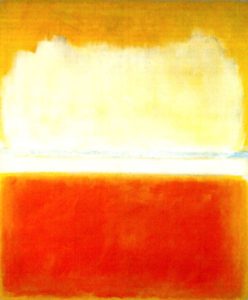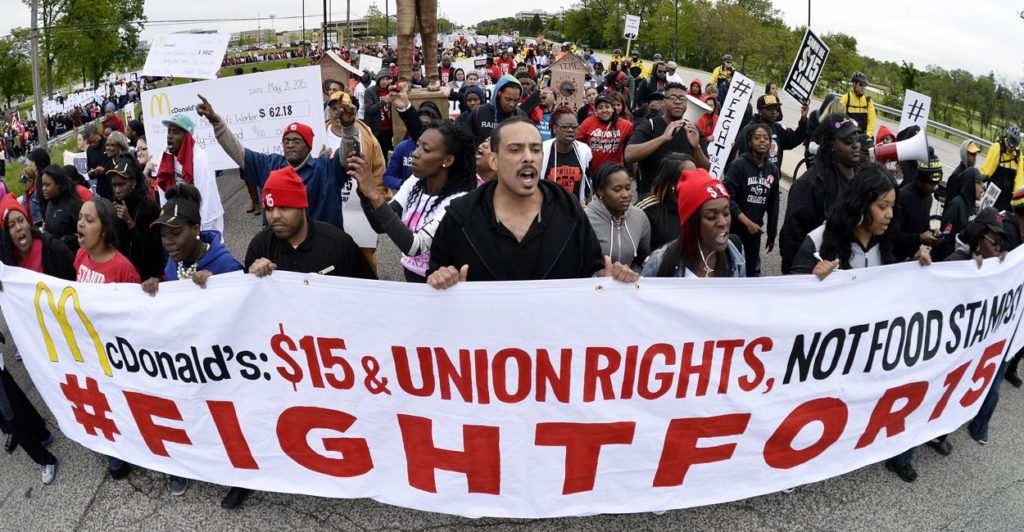
Mark Rothko no-8-1952
From childhood, it seems, we are inculcated with the grand themes of Passover: freedom from slavery! Liberation! Then, in different ways, we translate those themes into usable models for our lives: just as we were liberated, so too must we work for the liberation of others. As Michael Walzer documented in his book Exodus and Revolution, the Exodus story has inspired many groups in many parts of the world to revolution, to radically change their material existence.
Sometimes however, the overwhelmingly large themes overshadow the equally important though smaller moments. Those moments are often the things that actually move the dial, make a difference in the world. There is a wonderful and very short story in the Talmud (Pesachim 115b). The story follows a detailed discussion of the intricate choreography of the seder meal, the liturgical meal that Jews celebrate on Passover eve. Food on trays is brought in and then taken out. Wine is poured and drunk, and then poured again. Foods are dipped. And so on.
The question is asked: why is all this done? That is, why is there so much choreography, so much disruption? The answer is given: so that the children will see and ask questions. Immediately, the following story is told:
Abaye was sitting before Rabbah,
[Abaye] saw the tray taken up from before [Rabbah].
Said [Abbaye] to them: We have not yet eaten, and they have come [and] removed the tray from before us!
Said Rabbah to him: You have exempted us from reciting, ‘Why [is this night] different?’ [mah nishtanah]
(Bavli Pesahim 114b)
Part of the seder ritual itself is pointing out the differences between the Passover night meal and other meals. This ritualized noticing is known as the the mah nishtanah or “Why is this night different?” Abbaye’s actual noticing that the tray was taken up at a surprising moment made the ritual recitation redundant.
This story comes to illustrate the point that the intricate and disruptive choreography is in order “that the children take notice and ask.” However, the “child” who notices is Abbaye, one of the foremost sages of the Talmudic academies.
The story raises another point. If the point of the evening is recounting the Exodus, why is it necessary to travel this long and winding road to the story of the liberation? Why does the seder not start with “We were slaves in Egypt…” and move on from there?
The digressions and diversions of the seder are, I would suggest, the point. At each stop of the ritual order we engage in some very specific activity which stops the flow of the conversation and forces us to focus on something else. The point of the ritual is not only, in the end, the largest themes—liberation, God, covenant. The point is engaging with others in community. The ritual of the seder happens around a table and not in a synagogue. Everybody is invited (ritually, too, all four children are present—the wise child and the wicked child, the simple child and the one who does not even know how to ask). It is in the small moments of social interaction, of give and take between people around the table, in which liberation happens. The point is not recounting the Exodus with great fanfare. The point is talking with others about it. Disagreeing, studying, learning.
This privileging of the smaller though perhaps more important moments comes to mind at this moment in our national history. We are engaged in a raucous presidential campaign. The differences between Democrats and Republicans are, as they say Yuge! However, at times, or to believe the pundits and my Facebook feed, the difference between Sanders and Clinton is also huge. While the campaign is truly important, and electing a Democrat president is important for future of our democracy, I want to suggest that right now, the cacophony of the internecine fighting is drowning out other work which is equally important.
 This past week New York State and California both passed minimum wage bills which will lift tens of thousands of people out of poverty. Last Thursday, in one of the largest national days of action, we celebrated that victory. However, we also marked the fact that there is more work to do. Activists from Clergy and Laity United for Economic Justice, Bend the Arc: A Jewish Partnership for Justice, Service Employees International Union, the Black Jewish Justice Alliance and tens of workers at six o’clock in the morning in a McDonalds demanding immediate access to a union and $15 an hour. (The current state legislation would raise the minimum wage to $15 an hour by 2022.) Thousands of people later marched through the streets of Los Angeles and other cities demanding that $15 an hour be the minimum wage nationally. The fact that we won in Los Angeles, and got legislation in California was not because of the electoral process but as a result of a movement from the streets up. This movement started with fast food workers walking off their jobs, not with elected officials.
This past week New York State and California both passed minimum wage bills which will lift tens of thousands of people out of poverty. Last Thursday, in one of the largest national days of action, we celebrated that victory. However, we also marked the fact that there is more work to do. Activists from Clergy and Laity United for Economic Justice, Bend the Arc: A Jewish Partnership for Justice, Service Employees International Union, the Black Jewish Justice Alliance and tens of workers at six o’clock in the morning in a McDonalds demanding immediate access to a union and $15 an hour. (The current state legislation would raise the minimum wage to $15 an hour by 2022.) Thousands of people later marched through the streets of Los Angeles and other cities demanding that $15 an hour be the minimum wage nationally. The fact that we won in Los Angeles, and got legislation in California was not because of the electoral process but as a result of a movement from the streets up. This movement started with fast food workers walking off their jobs, not with elected officials.
There is plenty of other work in various stages of process. Reforming the criminal justice system. Banning youth solitary confinement. Reforming hiring practices so that formerly incarcerated people can get jobs and rejoin the community. Holding police accountable when they break the law. Abolishing the death penalty. Addressing the moral challenges of having tens of thousands of homeless people living on the streets in one of the wealthiest cities in the country. Strengthening voting rights. Addressing gun control. Addressing racism and demanding that Black Lives Matter. Stopping Islamophobia and antisemitism.
These issues can get lost in the clang and clash of presidential debates and rallies. However, in this moment, it is of the utmost importance that we also keep our focus on the smaller moments, the moments in which we engage each other, debate, disagree, join forces and bring the necessary democratic pressure of the people to create a more perfect union.
Show me what democracy looks like!
This is what democracy looks like!
___________________
Getting involved
